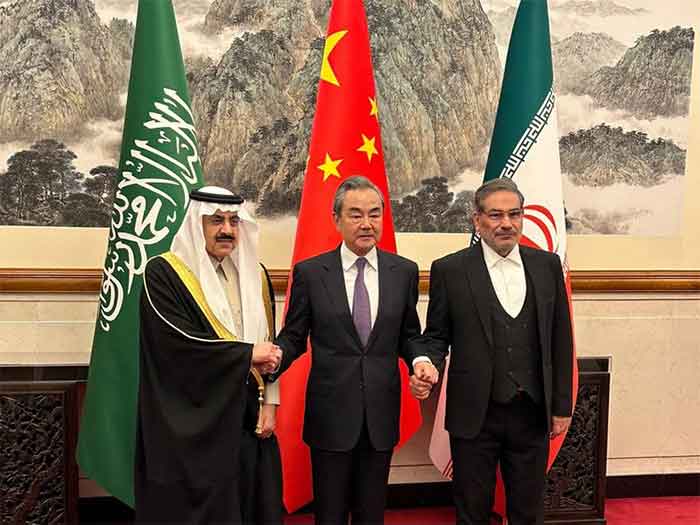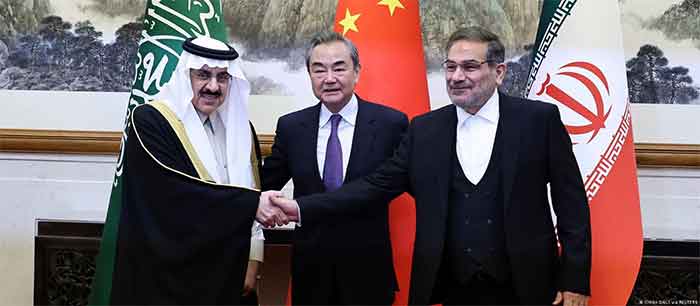
In a significant development, Iran and Saudi Arabia have agreed to restore ties. China has mediated in the deal. The two countries will also resume the security cooperation agreement signed in 2001. China’s role in mediating the agreement is a major diplomatic win for the rising power.
The news came Friday night attracting worldwide attention, and is seen as a breakthrough in bilateral relations for longtime regional foes Iran and Saudi Arabia.
Some analysts praised the efforts made by the two countries and China in seeking peaceful settlements of disputes amid global growing uncertainties.
Media reports said:
Saudi Arabia and Iran agreed on Friday to resume diplomatic ties and re-open embassies within the next two months.
Relations between Saudi Arabia, the Sunni kingdom, and Iran, the Shia republic, broke down in 2016, and the two powers have backed opposing sides in multiple regional conflicts.
The agreement came after several days of talks in Beijing. As a result of the negotiations, both countries agreed to reopen their embassies “within a period not exceeding two months,” and to commit to “non-interference” in each other’s internal affairs, according to a joint statement by Saudi, Iranian, and Chinese officials.
Riyadh and Tehran said they would resume a security cooperation agreement signed in 2001, and would work to enhance “regional and international security.”
Saudi Arabia severed diplomatic ties with Iran in 2016, after protesters stormed its diplomatic outposts there following the kingdom’s execution of a prominent Shia scholar several days earlier.
Previous rounds of talks aimed at resolving the tensions were held in Iraq and Oman in 2021 and 2022.
Aside from sectarian differences, the two regional powers have clashed on major geopolitical issues. Saudi Arabia has close economic and military relations with the U.S., while Iran has been heavily sanctioned by the U.S. over its nuclear program. Successive U.S. administrations have threatened Tehran with diplomatic or military consequences should it develop nuclear weapons, with U.S. Defense Secretary Lloyd Austin warning on Thursday that the U.S. “will not allow Iran to acquire a nuclear weapon.”
Riyadh and Tehran support opposing sides in the civil wars in Yemen and Syria, while Iran backs the Hezbollah movement in Lebanon. Saudi Arabia, along with the U.S. and Israel, consider Hezbollah a terrorist group.
In December, Iran accused Saudi Arabia – along with the U.S. and Israel – of inciting anti-government riots across Iran.
Speaking to the Iranian state-run news agency IRNA on Friday, Iranian National Security Council chief Ali Shamkhani said that he hopes the agreement will “clear misunderstanding and lead to the development of regional stability and security.”
Another media report said:
China, Iran and Saudi Arabia released a joint statement on Friday saying Iran and Saudi Arabia have agreed to re-establish ties and reopen embassies within two months after a negotiation meeting in Beijing.
On Friday, Wang Yi, director of the Office of the Foreign Affairs Commission of the Communist Party of China (CPC) Central Committee held the meeting between the Iran delegation headed by Ali Shamkhani, Secretary of Iran’s Supreme National Security Council and the Saudi Arabia delegation headed by Musaad bin Mohammed Al-Aliban, Minister of State, Member of the Council of Ministers, and National Security Advisor of Saudi Arabia. The joint statement was released after the meeting.
As per the joint statement reached by the three countries, the foreign ministers of Iran and Saudi Arabia are to hold talks aimed at implementing the decision and make the necessary arrangements for the exchange of ambassadors.
Stressing respect for sovereignty and non-interference in each other’s internal affairs, the two countries agreed to implement the agreement on security cooperation signed on April 17, 2001, and the general agreement reached on May 27, 1998, aimed at fostering ties in economic, commercial, investment, technical, scientific, cultural, sports, and youth arenas.
China, Iran and Saudi Arabia also expressed firm resolve to make every effort to strengthen regional and international peace and security.
Wang congratulated the two countries on taking a “historic step” in improving bilateral relations. The two countries have also laid the foundation for follow-up work by outlining the timetable for dealing with each side’s concerns.
Wang told reporters on Friday that the Iran-Saudi Arabia talks in Beijing have achieved a significant outcome and are a victory of dialogue and peace, bringing very good news to an unsettled world.
Wang also noted that the outcome sent a clear signal that the Ukraine crisis is not the only problem in the world and there are many issues concerning peace and people’s livelihood that call for global attention and proper handling.
No matter how complicated or thorny some issues are, maintaining the spirit of mutual respect to seek equal dialogue can help each side reach a settlement.
Wang also stressed that the Middle East belongs to local people and the region’s destiny should be held fast in the hands of peoples in the region’s countries. They can build a more stable, peaceful and prosperous Middle East by strengthening coordination.
By improving relations, Iran and Saudi Arabia have opened the door to peace in the Middle East, and set an example for settling disputes via dialogues. As a trustworthy friend of both Iran and Saudi Arabia, China is willing to continue playing a constructive role, Wang said.
The dialogue is also a successful application of the Global Security Initiative. As a kind and trustworthy mediator, China has fulfilled its responsibility as a host and will carry on being a constructive player in promoting the proper handling of global heated issues in accordance with each side’s willingness, said Wang.
Ali Shamkhani and Musaad bin Mohammed Al-Aliban also spoke highly of China’s major country diplomacy and expressed appreciation to China for hosting and promoting the meeting, and said they are willing to implement the consensus reached at the meeting to strengthen the neighborhood and jointly defend regional stability.
Saudi Arabia Keen To Join BRICS And SCO
Earlier media reports said:
Saudi Arabia is interested in joining the BRICS group of the world’s five major developing economies, as well the Shanghai Cooperation Organization, according to Russia’s Ambassador to the kingdom, Sergey Kozlov.
The five BRICS nations – Brazil, Russia, India, China and South Africa – currently account for more than 40% of the world’s population and nearly a quarter of global GDP. Meanwhile, the China and Russia-led Shanghai Cooperation Organization, a regional security bloc, includes major powers like India in its ranks.
According to the ambassador, the possibility of the Gulf nation’s membership in the SCO is being actively discussed, while the idea of joining BRICS is under consideration.
Earlier this year, Russian Foreign Minister Sergey Lavrov said that “more than a dozen” nations had expressed interest in entering the BRICS group.
Algeria, Argentina, and Iran have reportedly asked to join BRICS, while Bangladesh, Egypt, the United Arab Emirates and Uruguay are members of its New Development Bank. Argentina’s potential accession is supported by China according to several sources.
Bahrain, Bangladesh, Indonesia, Egypt, Mexico, Nigeria, Pakistan, Sudan, Syria, Turkey, the UAE, Venezuela and Zimbabwe have also shown interest in becoming BRICS members.
Saudi Arabia Ready To Ditch Dollar In Trade
Another earlier media report said:
Saudi Arabia is ready to discuss trading in currencies other than the US dollar, according to the Kingdom’s finance minister Mohammed Al-Jadaan, as cited by Bloomberg.
Al-Jadaan’s comments come a month after China’s President Xi Jinping said that Beijing is ready to make energy purchases in yuan instead of the US dollar in trade exchanges with members of the Gulf Cooperation Council (GCC). China’s leader highlighted the necessity of the shift while speaking at a Chinese-Arab summit hosted by Saudi Arabia earlier this week.
“There are no issues with discussing how we settle our trade arrangements, whether it is in U.S. dollar, in euro or in Saudi riyal,” Al-Jadaan said during an interview with Bloomberg in Davos, Switzerland.
The oil-rich kingdom is seeking to deepen its ties with vital trade partners, including China. The readiness for talks on the issue expressed by Riyadh may signal that the world’s biggest oil exporter is open to diversifying away from the U.S. dollar after decades of pricing crude exports in the U.S. currency. The riyal, the Saudi national currency, has been pegged to the greenback, too.
The trend towards the shift to national currencies that is recently being observed among the major participants in global trade chains is partially attributed to the policies of secondary sanctions that Washington is pursuing. Initially, the steps towards ditching the U.S. currency in trade, particularly in the energy sector, were intensified in the wake of the sweeping sanctions introduced by Western nations against Russia, one of the world’s major energy producers and exporters, over the military operation in Ukraine.












































